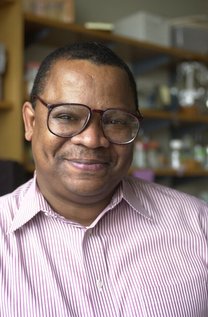Oral history interview with James L. Sherley
- 1998-Nov-20
- 1998-Nov-23
- 1998-Nov-24

James L. Sherley was born in Memphis, Tennessee, one of five children. His parents had been sharecroppers in a small town in Mississippi, but they moved to the Memphis area so that Sherley's father could become a worker in concrete; he worked his way up to supervisor and is now safety officer for DuPont. He also became a Baptist minister at about the time James was leaving for college. Sherley's mother's family gradually settled in the neighborhood, too, but Sherley's father's family stayed in Mississippi. As far back as he can remember, Sherley wanted to be a scientist; and he and one of his brothers were always performing experiments (making gunpowder, for example) in the backyard. In junior high school he decided he wanted to be a microbiologist. He attended a high school for college-bound students, to which he had to be bused; there an AP biology class solidified his desire to be a microbiologist and to go to Harvard. Some of his teachers encouraged him to apply elsewhere as well, but he was determined to go to Harvard. He had always done well in school, too; but though he was valedictorian of his high school, the administration thought it inappropriate that he give the commencement address (he is African-American) and asked the salutatorian (she is Caucasian) to do so instead.
At Harvard Sherley joined Alfred Loeblich's laboratory, working at first with algae. He went to Mark Ptashne's lab when Loeblich moved to the University of Houston. There he learned microbiology, worked on lambda phage, and took a course in tumor repression that pushed him into the study of cancer. He was advised that fully to realize his ambition to study cancer he should get an MD/PhD, so, although it was late in his undergraduate career, he became pre-med and eventually was accepted for the MD/PhD program at Johns Hopkins University, where he began his study of thymidine kinase in Thomas J. Kelly's lab. After receiving his MD and PhD, he took a postdoc at Princeton University, working in Arnold Levine's lab. His studies included T antigen and p53 antioncogene. His association with Levine's lab was not harmonious, and he accepted an associate membership in the Department of Molecular Oncology at the Fox Chase Cancer Center, where he stayed for seven years before running out of funding. From there he moved to Massachusetts Institute of Technology, where he is an assistant professor in the Division of Bioengineering and Environmental Health today.
Sherley is married to Marion Cunningham and has two young daughters. He continues to publish his work; to balance family life and work; and to worship God.
Access this interview
By request 1 PDF Transcript File and 12 Audio Recording Files
Fill out a brief form to receive immediate access to these files.
If you have any questions about transcripts, recordings, or usage permissions, contact the Center for Oral History at oralhistory@sciencehistory.org.









